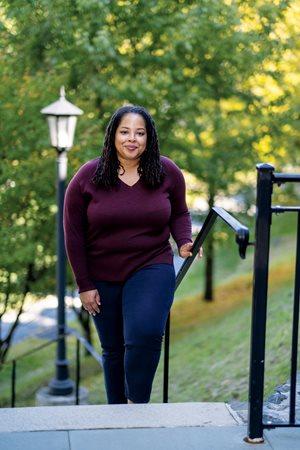 Christina Clemente
Christina ClementeAssociate Director of Admission
Hackley School, Tarrytown, New York
Photo by Jimmy Jenner Jr.
Growing up in the Bronx, New York, where I was surrounded by people who looked like me, I was never prompted to see my Blackness as anything out of the ordinary until my parents sent me to a predominately white independent school. Reading the testimonies from Black students and alums of our schools shared on Black@ Instagram accounts, I could not help but think about my own experiences at my alma mater.
I remember classmates touching my hair because it intrigued them, or a white classmate telling me I only got into my chosen college because I was Black. I also remember my 10th grade English teacher calling to my attention my innate ability to analyze prose thereby giving me the push I needed to speak with confidence during classroom discussions or traveling to Europe for the first time with my high school chorus. There were moments of pain and sadness but also moments of joy and love for my school community. I carried these conflicting emotions into my profession, a decade-long career in independent schools.
This past spring, racial tensions came to a head. As an admission officer who always must depict the school in its best light, I wondered, Why am I here? Reconciling the pain Black students faced with my own past pain was more than I could handle. A global pandemic was decimating our nation’s Black and Latinx communities, members of law enforcement were continuing to devalue Black lives with fatal acts of violence, and our politically polarized country was gearing up for a presidential election. I was exhausted, and I was hopeless.
A turning point came in late August 2020 when I attended a virtual event hosted by my alma mater. The goal of the event was to share with alums the institution’s plan to move toward becoming anti-racist. Current Black students shared some of the action steps they want to see the school take, such as developing more inclusive English and history curricula, improving the college counseling process, and hiring more Black administrators and teachers. What resonated the most was their plea to Black alums: We must become more involved and provide mentorship, speak at assemblies, and offer guidance about the college admission process as well as life beyond high school. I now realize just how much they need me and my fellow Black alums. In a moment when I felt completely powerless, they considered us to be anything but.
Just as I think about the Black students at my alma mater, I also think about the Black students at my current school—they need to have role models like me and my Black colleagues advocating on their behalf and supporting them in their activism to make our institutions truly inclusive. I will amplify their demands until they are heard, I will stand with them in solidarity so that they never feel alone, and I will embrace my power so that they never doubt their own.